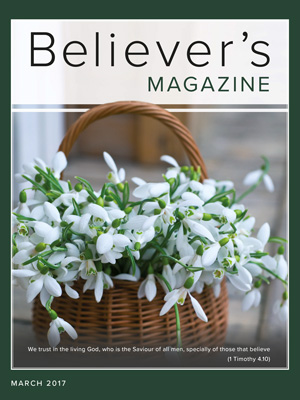One aspect of the exceptional ability of Solomon was his knowledge of the natural world: “And he spake of trees, from the cedar tree that is in Lebanon even unto the hyssop that springeth out of the wall: he spake also of beasts, and of fowl, and of creeping things, and of fishes” (1 Kgs 4.31-33).
Of his 1,005 songs, only one is recorded in Scripture, and it is therefore known as ‘The Song of Songs’. Within that best of songs, inspired by the Holy Spirit, Solomon gave us many beautiful portraits of Christ, yet he himself (notwithstanding all his God-given knowledge and wisdom) did not know the full import of the things that he wrote. Solomon’s knowledge of the natural world was unsurpassed, and no man has known more of earth’s glory than he, but one day the Lord Jesus said to His disciples “Consider the lilies how they grow: they toil not, they spin not; and yet I say unto you, that Solomon in all his glory was not arrayed like one of these” (Lk 12.27). The humblest flower is possessed of more glory than man at his best!
Trees, too, are often used in Scripture to describe men, and the parable spoken by Jotham, when Abimelech conspired for the throne of Israel, is one such example (Jdg 9.7-15). Another is seen in Isaiah 2.13, where proud men are described as “cedars of Lebanon” and “oaks of Bashan”. But the picture of the apple tree among the trees of the wood, recorded by Solomon, speaks delightfully of the Lord Jesus, and especially of His uniqueness as a man amongst men.
The Tree Encountered
On beholding an apple tree amongst the trees of the wood, perhaps the first reaction would be one of amazement that it was ever there at all. More often than not in Scripture, the Hebrew word translated “wood” is rendered as “forest”, so the presence of an apple tree is the more wonderful. In the dank and menacing darkness of the forest, there suddenly appears to our gaze an object of delight: a tree, but unlike any other tree around it. This tree is unique in its fairness, its fragrance and its fruitfulness! What beauty we find in holy contemplation of the Lord Jesus, as He moved amongst men in humble devotion to His Father’s will. The proud, unyielding ‘cedars’ of Israel’s rulers had nothing of the moral glory that ever marked the Saviour in His humility. As He moved through the dank and rotting undergrowth of this fallen world, there was a fragrance about Him that ceaselessly delighted the Father. Moreover, He was the true Joseph, “a fruitful bough, even a fruitful bough by a well; whose branches run over the wall” (Gen 49.22).
The Tree Enjoyed
There are many people who, reading or hearing of the sinless perfection of the Lord Jesus, are ready to acknowledge His fairness “among the sons”. Alas, though, they are not ready to accept His shelter, and they know nothing of His sweetness. The believer, in recalling the day when they trusted Christ for salvation, can say from the heart “I sat down under his shadow with great delight”. He is a place of rest, and a place of refuge for the needy sinner. But the believer can also say, as might a weary pilgrim, “I sat down … and his fruit was sweet to my taste.” Just as there are some who admire Christ, but have never trusted Him as Saviour, so there are also those who have availed themselves by faith of the eternal shelter He provides, but they neglect the satisfaction and refreshment of soul that He alone can give. The pictorial theme in this month’s Believer’s Magazine is flowers and trees. Why not consider that subject in Scripture, and see how many pictures of Christ it portrays? Take the time to sit under His shadow, in contemplation of Himself, and be refreshed by His sweetness.









